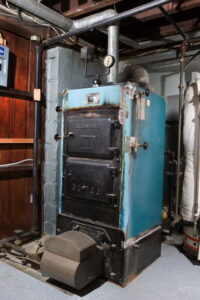If you’re asking this question and looking for answers online, it’s probably because you think you’ve found corrosion on your gas furnace in Conyers, GA. Or perhaps you’re curious because you have an older furnace and you want to know what can happen to it as it ages. Whatever the reason, we’re glad you asked because corrosion is an important topic when it comes to furnaces.
So the simple answer is, Yes, a gas furnace can corrode. It’s not something you want to happen, and it’s often a warning that the furnace needs to be replaced.
How Corrosion Occurs in a Furnace
When people think of corrosion, they usually think of rust first, which is one of the most common types of corrosion. But because people think of rust as only occurring because of water in contact with metal, they might not think it can happen in a gas furnace. A gas furnace doesn’t use water to heat the air, so how could it corrode?
A gas furnace may not circulate water, but it does create water vapor during its combustion process. As the combustion gasses in the heat exchanger cool down during the heating cycle, they turn into a vapor that contains water moisture. Along with the water moisture are other vapor chemicals that can also lead to corrosion. Most of this moisture escapes out of the exchanger through the flue. However, after many years of the metal in the heat exchanger being exposed to these vapors, corrosion may begin to form. Corrosion can also start to appear in the flue or other places where exhaust vapors move.
The process of corrosion will speed up if the furnace isn’t venting properly. You may have a furnace that safely removes toxic gasses but still allows too much combustion vapor to remain in the exchanger.
Another way that corrosion can start in a furnace is from leaks coming from the air conditioning system. In most HVAC setups, the AC unit is located over the furnace. If condensate moisture begins to leak from the air conditioner because of a malfunction, it will drip down onto the furnace and lead to corrosion.
Why Corrosion Is a Serious Problem
You don’t want corrosion on a gas furnace because it weakens the metal and can allow for combustion gasses to escape from the heat exchanger. This is a major danger because it places toxic gasses such as carbon monoxide into the air that is blown into the house. Cracks in a furnace’s heat exchanger require immediate attention. Either the heat exchanger must be replaced or the entire furnace replaced. If the furnace is already old (15 years or more), then it’s best to have a new furnace installed.
The best way to prevent corrosion from getting an early hold on your furnace is to always have professional maintenance for it each year. Our technicians will carefully inspect the unit for indications of corrosion and ensure the furnace is venting properly.
If you notice corrosion anywhere on your gas furnace, please stop using it and call us to help you.


